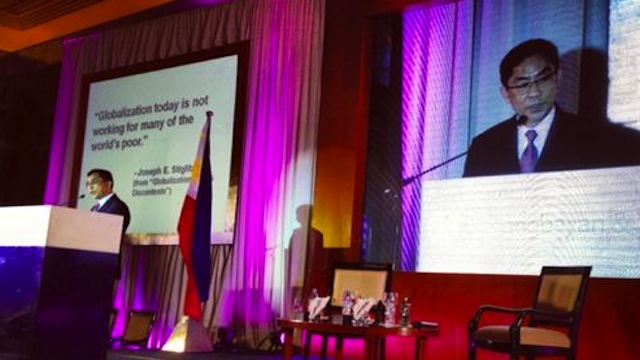SUMMARY
This is AI generated summarization, which may have errors. For context, always refer to the full article.

MANILA, Philippines – Will the ASEAN economic integration translate to more local jobs?
That is the hope of the ambitious regional plan, said Jollibee Foods Corp. chief finance officer Ysmael Baysa.
However, if the Philippines is not competitive enough, Baysa warned it may see more jobs lost than created when ASEAN transforms into a single, common market.
“If [lower-priced] rice becomes available in Vietnam and Thailand, what will happen to our farmers in the Philippines? What will happen if chicken becomes available in Thailand at lower prices? Or sugar?” Baysa asked participants in the Punongbayan & Araullo CEO Business Forum in Makati City on Tuesday, October 23.
Baysa raised this concern even as he acknowledged the benefits of an integrated market to companies like Jollibee, which aims to become a major fast food operator in the region.
Click on this link for Rappler’s blow-by-blow account of the P&A Forum on the ASEAN 2015.
ASEAN countries — the Philippines, Brunei, Cambodia, Indonesia, Laos, Malaysia, Myanmar, Singapore, Thailand and Vietnam — eye to become an integrated market like the European Union where a free flow of goods, services, capital and labor is seen. Crucial in making this happen is the streamlining of business procedures and lowering of tariffs, with the latter projected to boost supply of imported goods among the member-countries.
Baysa said lower tariffs will give Jollibee more options on where to source its raw material needs, resutling in lower costs for the company.
He said currently, the company sources 70% of its raw materials from the Philippines because they are cheaper here.
“If tariffs are lowered under the [integrated ASEAN market], there might be a big change in our raw material sources,” he noted.
He cited for example, that they may source chicken and sugar from Thailand, and rice and pork from Vietnam rather than the Philippines as import tariffs on these product will go down to 0-5% under an integrated market, from the current 45%.
Essentially, this means lower demand for locally produced goods.
Quoting American Nobel Prize-winning economist Joseph Stiglitz, Baysa said, “globalization today is not working for many of the world’s poor. There are many economic benefits but there are also many dislocations.”
The challenge therefore is how ASEAN countries will gain market share in the world without “competing against each other.”
“It should not be a zero-sum game, where some countries lose and some countries win. ASEAN countries should not compete with each other, but with other regional economic blocs.”
“To me, a very important measure of the success of the [market integration] by 2015 is not just lower inflation or lower costs, but more jobs in all countries in ASEAN,” he concluded. – Rappler.com
Add a comment
How does this make you feel?
There are no comments yet. Add your comment to start the conversation.